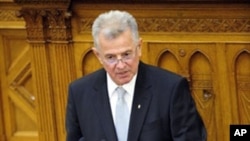Hungary is introducing on Saturday a controversial media law that critics say will turn the clock back and re-introduce totalitarian rule in the former Communist nation. Under the legislation, journalists can face huge fines if their coverage is deemed unbalanced. The controversy comes as Hungary takes over the rotating presidency of the European Union on Saturday.
The well-known Hungarian songwriter Lilla Vincze sings nostalgically about romance and Hungary in a famous Budapest bookstore. Among her audience are Hungarian journalists, writers and readers who have come to support the struggling left-leaning newspaper Nepszava, one of several publications protesting a new media law.
Eighty-one-year-old Hungarian author and philosopher Agnes Heller, a former dissident, is here. She said she has been asked to join an alternative Internet television station aimed at challenging the upcoming legislation. She said Prime Minister Viktor Orban - whose center right government has introduced the law - does not realize times have changed in the Internet era.
"Nowadays you can have a server in another country," said Heller. "And you cannot censor an Internet production if the server is in another country. Some people organize a so-called 'samizdat' television station on the Internet and asked me to participate. So the technology is above it. In the classical style of the Soviet Union, technology allowed that everything could be supervised. Now not everything can be supervised. So, Orban will not succeed."
The legislation has been compared by the opposition to the way the press had been treated during Hungary's Communist era and under other totalitarian regimes.
Under the new law, a government-appointed media council will have the power to decide whether a publication has broken rules on what it calls balanced and 'moral' reporting, and can issue heavy fines.
Print and Internet media can face fines of more than $100,000 and broadcasters nearly $1 million, if, for example, their coverage is deemed unbalanced. News programs cannot use more than 20 percent of their airtime on crime-related stories, and journalists may be forced to reveal their sources.
Presenters at Hungarian state-run radio have already been dismissed for protesting the law on air.
Nepszava's chief editor Peter Nemeth has published a blank front page to protest the proposed law.
"This front page was empty, absolutely empty," said Nemeth. "In the new year, when Hungary becomes the president of the European Union, we will repeat this action. We want to send a message to the European Union that this media law is not good."
When VOA reporter asked, "Do you think that the situation will be the same as under Communism when the media was not free?" Nemeth replied, "It will be similar. Absolutely it will give a chance for dictatorship."
The media law comes as Hungary takes over the rotating European Union presidency on New Year's Day. The law has caused international criticism.
Luxembourg Foreign Minister Jean Asselborn said the law "raises the question whether such a country is worthy of leading the EU"
German deputy Foreign Minister Werner Hoyer has warned of "serious concern if there is only the smallest suspicion" of media freedoms being restricted while German Chancellor Angela Merkel said through a spokesperson that her government is watching the media law "with great attention."
Advocacy group "Reporters Without Borders" urged the European Parliament on Friday to put the media law high on its international agenda.
The group's Chief Representative to the EU, Olivier Basille, said the legislation is the worst media law of all European Union countries, including Italy, where the prime minister attempted to sue international media.
Basille said Hungary's media law violates European agreements and that it also may target foreign journalists based in Hungary, especially if they work for Internet media. "In all the treaties you say that European citizens have the same rights. Which is not the case today for Hungarian citizens and for people who are living in Hungary and who are going to publish in Hungary. Because yes foreign correspondents will be sued like any journalist or like any blogger in Hungary because they are publishing something on Hungary and [are] based in Hungary," said Basille.
There also is international concern that the legislation will lead to censorship. But Andras Koltay, a member of the new media council, strongly disagrees.
Koltay said he doesn't think there is a danger this legislation will force journalists into self censorship. Instead, he said, the law will ensure more balanced media. He adds that it also will bring order in the media, because they are currently having to work on the basis of confusing laws from the 1980s and 1990s. He argues the law is to the advantage of both the media and the public.
The media legislation is the latest in a series of measures that critics say will turn Hungary into 'Orbanistan', a reference to Prime Minister Orban and autocratic Central Asian republics. Orban and his cabinet also have curtailed the powers of the respected constitutional court so it can not rule on budget matters.
That move has allowed them to force citizens to shift their pensions from private to state plans in an effort to raise $14 billion to cut the budget deficit without having to introduce unpopular austerity measures.
Additionally, they have taken control over other key financial institutions, including the State Audit Office, and seek to push out the head of the traditionally independent central bank in a struggle over who controls fiscal policy of the deeply indebted nation.
There is little the opposition can do. The ruling Fidesz party holds a crushing two-thirds majority in parliament, allowing it to change the constitution and introduce tough legislation.
Hungary Introduces Europe's Most Restrictive Media Law
- By Stefan Bos












